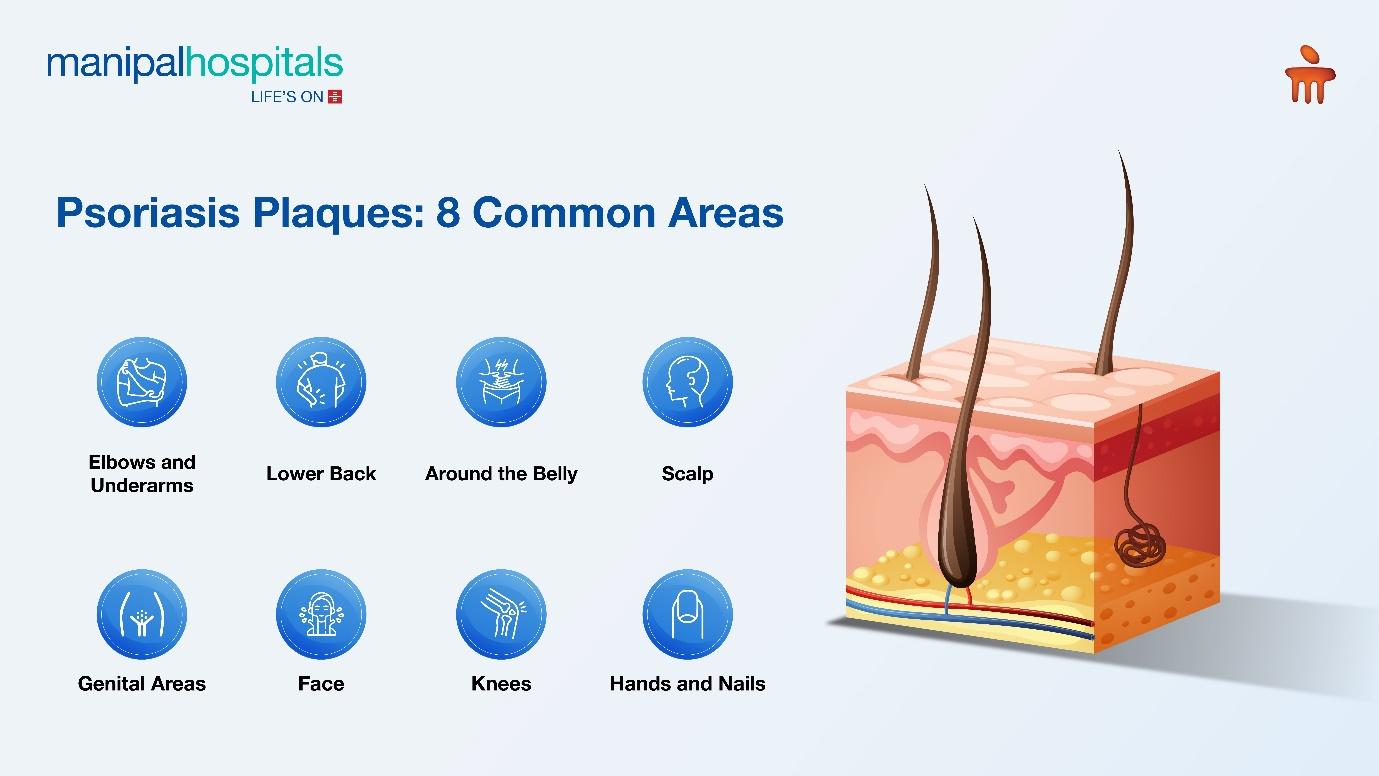
Psoriasis is a chronic inflammatory skin condition characterised by the rapid growth of skin cells, leading to thick, red, scaly patches known as plaques or plaques skin disease. These plaques can cause itching, and discomfort, and can significantly impact a person's social, mental, and overall well-being. People with psoriasis often face stigmas due to the visible nature of their condition, which can lead to social isolation and mental health challenges such as depression and anxiety. Understanding, empathy, and education are key to supporting those living with psoriasis and combating misconceptions about the disease.
Synopsis
Understanding Psoriasis Plaques
psoriatic plaque psoriasis is the hallmark of plaque psoriasis, the most common form of plaque skin disease. These plaques are raised, inflamed, and covered with silvery-white scales. They can appear anywhere on the body and are often itchy and painful. The exact cause of psoriasis is not fully understood, but it is believed to be related to an immune system malfunction that causes skin cells to grow too quickly.
Causes and Triggers of Psoriasis
1. Causes
Psoriatic plaque psoriasis is believed to be a combination of several causes, such as:
- Genetic Factors: It can run in families, suggesting a hereditary component
- Environmental Factors: Cold weather, pollution, and less sunlight can often contribute to developing the condition.
- Lifestyle: Such as smoking, alcohol, and obesity increase the risk of developing psoriasis or worsening its symptoms.

Triggers that can exacerbate psoriasis include:
- Stress
- Infections
- Skin injuries
- Hormonal changes
8 Most Common Areas of Psoriasis Plaques
-
Elbows and Underarms: One of the most common areas affected by psoriasis plaques is the elbows. The skin in this area is prone to friction and pressure, which can trigger plaque formation. Underarm involvement can also occur, making movement and daily activities uncomfortable.
-
Lower Back: The lower back is another frequent site for plaque skin disease. This area is often covered by clothing, which can aggravate the plaques due to friction and sweating, leading to increased itching and discomfort.
-
Around the Belly: Psoriasis can develop around the belly, particularly in the navel area. This can be particularly bothersome due to the skin folds and constant movement, which can cause irritation and exacerbate symptoms.
-
Scalp: Scalp: Scalp psoriasis is a common condition that can range from mild, dandruff-like scaling to severe plaques covering the entire scalp. It can extend to the forehead, back of the neck, and around the ears, causing significant distress and self-consciousness.
-
Face: Psoriasis can also impact the face, including the forehead, eyebrows, and around the mouth, although it is less common. Facial involvement can be particularly distressing due to its visibility, impacting self-esteem and social interactions.
-
Hands and Nails: Psoriasis can affect the hands and nails, leading to thickened, pitted nails and painful, cracked skin on the hands. This can interfere with daily tasks and make simple activities like writing or cooking challenging.
-
Knees: Like the elbows, the knees are commonly affected by psoriasis plaques. The skin on the knees is often subject to pressure and friction, which can trigger plaque formation and cause significant discomfort.
-
Genital Areas: Psoriasis can develop in the genital area, affecting the groin, buttocks, and upper thighs. This can be particularly painful and challenging to manage due to the sensitivity of the skin in these regions.
Diagnosis and Treatments
Diagnosing psoriasis often involves a physical examination and may include a skin biopsy. Plaque psoriasis treatment options vary depending on the severity and location of plaques. Common approaches include:
-
Topical Medications: Creams, ointments, and lotions containing corticosteroids, coal tar, or vitamin D can help reduce inflammation and scaling and are considered one of the effective treatments for plaque.
-
Light Therapy: Ultraviolet light therapy effectively slows skin cell growth and significantly improves symptoms.
-
Oral and Injected Medications: In severe cases, doctors may prescribe oral medications or injections to target the immune system.
Living with psoriasis can be challenging due to its physical, emotional, and social impact. However, individuals with psoriasis can lead fulfilling lives with a proper understanding of the condition, support, and effective treatment. Educating ourselves about plaque psoriasis and promoting empathy and awareness can help reduce stigmas and improve the quality of life for those affected by this condition. If you or someone you know is struggling with psoriasis plaques, seek professional medical advice from KMC Hospital, Mangalore an appropriate plaque psoriasis treatment plan to manage and alleviate symptoms effectively.
FAQ's
Psoriasis is not contagious but a chronic inflammatory skin condition. Unlike bacteria, it cannot be transmitted from person to person through contact.
Several factors can exacerbate psoriasis symptoms and worsen plaques. These include:
- Stress
- Skin irritants
- Alcohol consumption
- Smoking
- Certain medications
- Weather changes
While there's no cure for psoriasis, home remedies can help manage symptoms and alleviate discomfort. Here are some tips:
- Moisturise regularly
- Take lukewarm baths
- Expose yourself to sunlight
- Manage stress





















 3 Min Read
3 Min Read



















